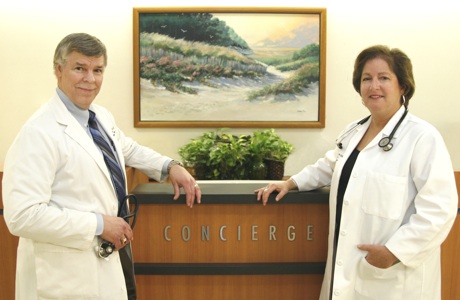

The Virginia Beach Premier Medical NewsletterOctober, 2011
Influenza Vaccine
The flu vaccine should be given to all adults who wish to reduce their risk of getting influenza. It is especially important for those of us over 50 years of age because of the higher morbidity and mortality that occurs in older patients who get the disease. Health care personnel, patients in chronic care facilities, those who live in barracks and dormitories, persons with diabetes, heart or lung disease, kidney disease and people with suppressed immune systems and those who have an increased risk of aspiration are all high risk individuals and should receive the vaccine.
There are two types of vaccines. One is a trivalent inactivated (dead) virus that can be given intramuscularly (by shot) that is appropriate for all ages. Another one, which we don’t use in our office, is a live, attenuated (weakened virus) that can be given by intranasal spray to healthy people aged 2-49. One great misconception is that people can actually get the flu from the vaccine. This is not true, since the virus is either dead or too weak to cause an infection. What does happen rarely is that the body can mount an exaggerated immune response to the vaccine such that a low-grade fever, general malaise and body aches can occur for 24-48 hours after the dose is given. This goes away spontaneously and is rarely if ever as severe as the actual influenza infection would be. Nevertheless there are those who have had a significant enough reaction to the vaccine in the past that they do not want to risk it again. Indeed the vaccine should never be given to anyone who is allergic to eggs or who has had Guillain-Barre syndrome. Ask your doctor if you have any questions about the vaccine.
Temporomandibular Disorder
This is also known as Temporomandibular joint (TMJ) syndrome. It can be a very painful disorder localized around the joint where the lower jaw meets the skull right in front of the ear on each side. Along with pain, there can be clicking and popping sounds, jaw clenching, teeth grinding and increased pain on chewing.
Treatment includes jaw relaxation techniques, hot packs, anti-inflammatory medicines, and dental splints. Reducing stress that causes jaw tension may be an important part of treatment. Joint injection and/or surgery are available but are last resorts.
Kidney Stones
Kidney stone disease can be very painful, particularly when a stone moves down from the kidney through the ureter to the urinary bladder. It’s said to be one of the worst kinds of pain anyone can experience. It is often associated with nausea and blood in the urine as well.
About 80% of the stones are calcium oxalate, 10% are calcium phosphate, and the rest are made of uric acid, struvite and cystine. 85% of them pass by themselves without intervention. Low fluid consumption often is the precipitating cause of stone formation. If you drink more than 2.5 quarts of fluid a day, you will be 30% less likely to form a stone than those who drink less. If you take a thiazide diuretic, this reduces the risk of stone formation because it reduces the amount of calcium in the urine. Potassium citrate supplements or foods high in citrate can also help. Preventing and controlling urinary infections is also important to prevent stone formation.
Congestive Heart Failure
CHF is a major cause of morbidity and mortality and unfortunately is quite common. It is usually caused by a generalized weakening of the heart muscle due to coronary artery disease, diabetes and/or valvular abnormalities. It could also be caused by viral infections of the heart. Sometimes the cause is not evident.
What happens in CHF is that the weakened heart does not pump the blood forward as well as it should. The blood that is trying to get into the heart from the veins in the lungs and other parts of the body begins to build up causing increased pressure in those veins. When that pressure reaches a critical point then water begins to seep to the outside of those veins and builds up in the air sacs of the lungs and in the other tissues of the body causing edema or swelling. The treatment usually involves medication to get rid of the excess fluid, improve the function of the heart and reduce its workload. This can keep the condition under control often for many years.
Creating Neurons from Other Cells
Scientists are getting very close to being able to convert adult cells called fibroblasts into neurons.
Earlier experiments showed that neurons could be created from embryonic stem cells. This new research, however, shows that neurons cal be created directly from adult fibroblasts (not stem cells), by genetic manipulation.
These neurons can actually form synapses with other natural neurons both in the culture tube and when implanted into mice brains. A lot of further research is still required before this can be used in the treatment of disease. However, if all goes well, this technique could potentially revolutionize the treatment of many severe neurologic disorders like Parkinson’s disease, stroke, spinal cord injury, ALS, MS and maybe even Alzheimer’s disease.
Determining Future Risk of Diabetes
A new blood test is now available in our office, called “Pre-Dx”, which can help to determine your future risk of diabetes mellitus.
This is actually a combination of laboratory tests that measure various indicators of diabetes risk. Each test by itself may not tell much, but when they are taken together, the future 5-year risk of diabetes can be determined with a high level of accuracy. Most insurance companies will cover this test when an appropriate diagnosis code is used. For example, if you are overweight, already have high blood pressure, elevated cholesterol levels or even just a mildly elevated blood sugar, you may qualify to have the test done and have it be paid for by your insurance. No co-pay or out of pocket expense is required if your insurance covers it. The blood test must be done fasting (no food after 10PM the night before) and can be drawn in our office. The results usually will take about a week to get back.
Migraine Headaches
This is a recurring headache disorder usually lasting from 4-72 hours - usually one-sided, throbbing, moderate to severe in intensity, usually aggravated by physical activity and often associated with nausea or photophobia.
An aura can occur before the headache develops in about one third of patients. This may consist of temporary flashes of light, partial loss of vision, numbness of the face or hands, speech impediments, sensitivity to odors or other unusual neurologic symptoms.
Sometimes, instead of an aura, there are pre-headache symptoms of yawning, fatigue, mood alteration or light sensitivity.
The headache is often followed by a period of fatigue and difficulty concentrating.
Migraines can be precipitated by certain triggers like alcohol, physical exertion, menstruation, stress, weather changes, sleep deprivation, hunger, changes in eating or sleep patterns, air travel and high altitudes.
Thunderclap Headaches
This is a severe, explosive headache that reaches peak intensity within 60 seconds of onset. It can be a sign of an acute intracranial hemorrhage and requires immediate evaluation with CT scan and possibly even lumbar puncture, MRI, MRA, or CT angiogram to check for aneurysms or other vascular disorders of the brain.
In 20% of cases, however, no serious underlying cause can be found. In these cases, it is not considered dangerous, but the pain is nevertheless very severe temporarily, but it then resolves spontaneously. These so-called idiopathic thunderclap headaches often occur during episodes of physical exertion, sexual intercourse, or during Valsalva maneuvers such as excessive coughing or vomiting.
About Our Office
Virginia Beach Premier Medical is a membership “concierge” internal medicine practice specializing in comprehensive and compassionate, individualized and personalized patient-centered care. We pride ourselves on full continuity of care – in the office, in the hospital, or even at home.
Coordination of Care
One of the greatest things about our practice is that we specialize in coordination of care for our patients.
The current medical system is often very fragmented such that people go from one specialist to another with no one in the center of it all to direct, coordinate and manage the whole person. Someone needs to be looking at everything that's happening, reviewing all the medicines, making sure that all the bases are covered, all the preventive tasks are being done. Someone needs to talk with the patients, explain things, and help them make decisions about their health care. That's what we do. We serve as the hub of medical care for our patients. All the specialists, labs and radiologists report to us about our patients, and we keep track of it all in one place. We communicate directly with our consultants. We explain everything to our patients and help them understand what is going on. We help people organize and manage their medications, and we provide case management and advocacy for our patients so they don't have to feel alone in this complex medical world.
If you would like more information about our practice please call us at 757-416-6750 or visit our website at www.vbpm1.com. Ask to speak with Brittany, our office manager, or Dr. Parks or Dr. Warth. We’d be happy to talk with you anytime.
Happy Halloween!! |




